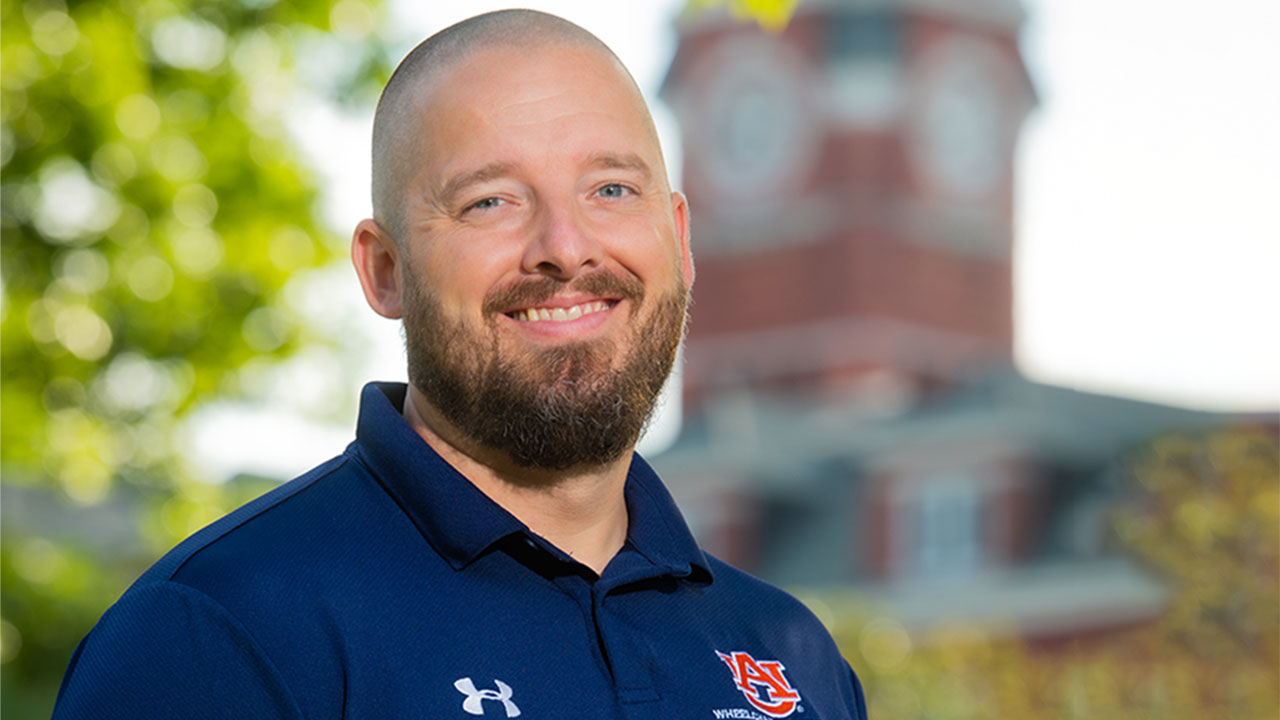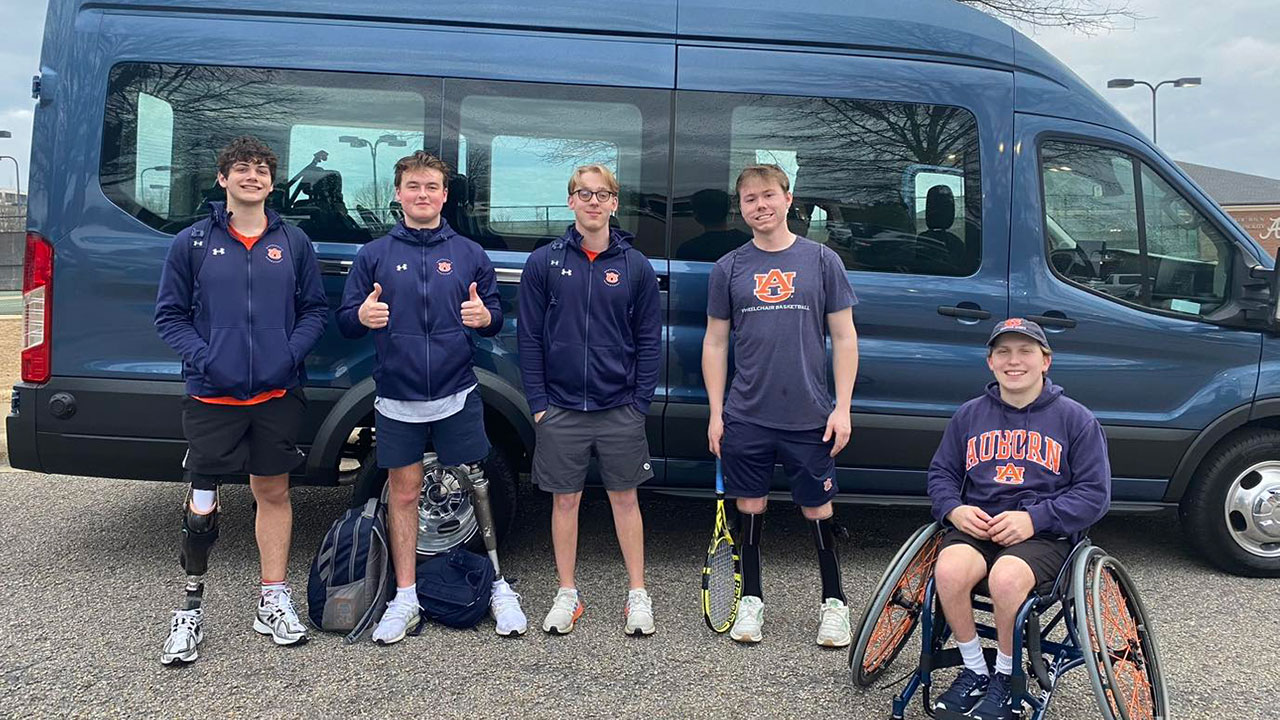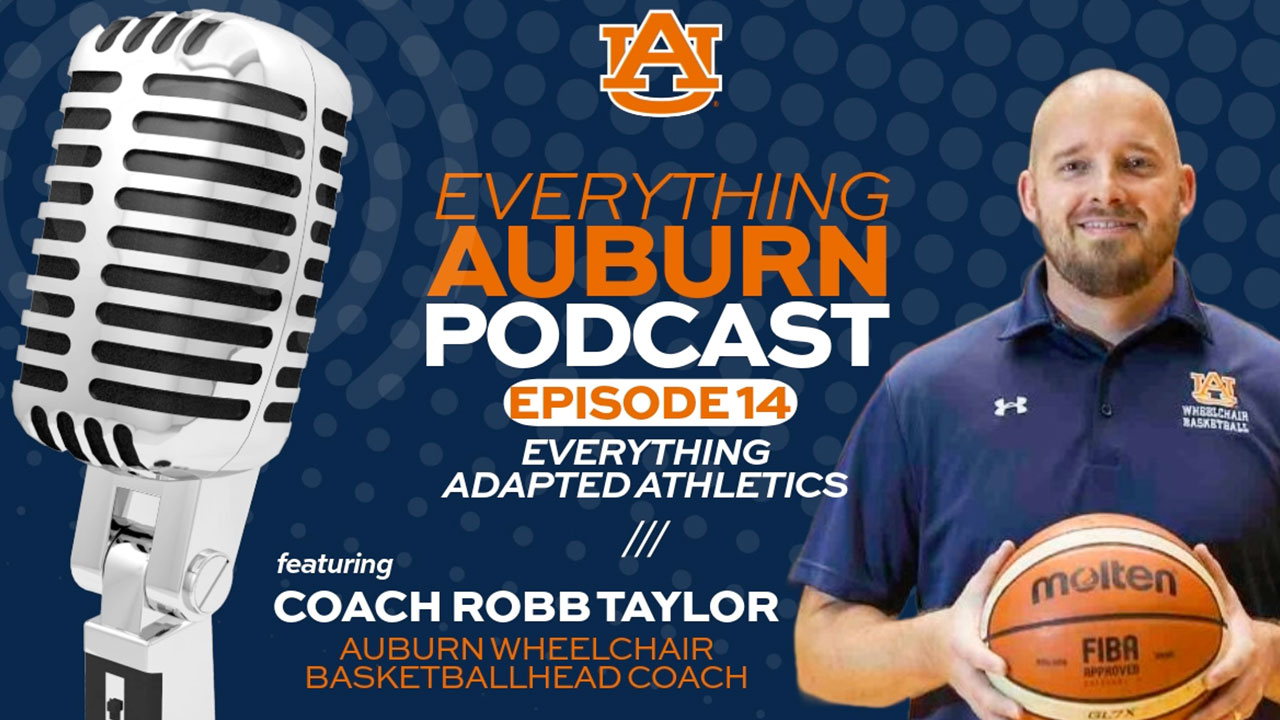content body

Auburn Wheelchair Basketball Team Coach Robb Taylor.
February was a month of triumph for Robb Taylor, head coach of Auburn University's Wheelchair Basketball team: celebrating his 100th win as the team’s head coach, securing a five-star recruit for next year, and launching a third sport for Auburn Adapted Athletics.
But bigger than the wins themselves? Celebrating with members of the team—both past and present—and the larger Auburn Family. Taylor said hearing from nearly all 20 team graduates, including players, trainers, and coaching staff, in a single weekend reflects the bonds that are forged on these teams.
"I think I'm almost at the point where I can tell you where every single one of our graduates is and what they're doing," says Taylor, reflecting on the student-athletes he’s coached since he arrived at Auburn in 2016.
Taylor's journey into wheelchair basketball began in his childhood in Chicago, where he witnessed the game's power firsthand through his uncle Jim, a wheelchair basketball enthusiast. Inspired by his uncle's love and success with the sport, Taylor embarked on a coaching career that led him from the University of Illinois to the Phoenix Mercury and eventually back to Chicago before finding his calling at Auburn.
As the basketball team sets its sights on the National Wheelchair Basketball Intercollegiate Men’s Tournament this week at Southwest Minnesota State University, Taylor wants to continue the momentum of excitement and success to advance the wheelchair basketball team, and the entire Adapted Athletics programs, at Auburn.
Building a culture of excellence
When he joined Auburn eight years ago, Taylor had a clear charge: to grow and expand Adapted Athletics.
The Adapted Athletics program—a partnership between Auburn’s Office of Accessibility and the School of Kinesiology— began in 2009 with Wheelchair Tennis and one student-athlete and grew quickly to include wheelchair basketball.
“When I took over the program in 2016, we were one of the newest wheelchair basketball teams within the College Division, and we had just a handful of student-athletes,” Taylor said. “Now we've got 13 student-athletes on our roster with the basketball team, and we’ve established ourselves as a top-tier team—we finished fourth in the National Wheelchair Basketball Tournament last year.”
Auburn’s Wheelchair Tennis program is also competitive, with six student-athletes now playing for the team. They finished last year’s national championship as runners-up, which Taylor said was a “tremendous accomplishment for the team.”
“One great thing about that championship event is that it took place during the NCAA national championships, so both the Auburn Men’s and Women’s Tennis teams were there. Players from both teams came out to cheer on our Wheelchair Tennis athletes while they played for the championship,” Taylor said. “That was a great event and something we all enjoyed being a part of.”
Under his guidance, the programs have flourished, with student-athletes excelling both academically and athletically.
“I think we all know that Auburn holds itself to high standards when it comes to academics. So, anyone who gets accepted into Auburn is already near the top of their class from an academic standpoint,” Taylor said. “And what we ask of our student-athletes is no different from what you see in athletes who are part of the athletic department. They're full-time students and on top of that, are close to full-time employees when it comes to their athletic responsibilities.”
Specifically for Wheelchair Basketball, the team practices daily at 6 a.m., so players are on the court warming up at 5:45 a.m. Taylor said the students lift either two or three times a week, depending on where the team is in its season, and they participate in shooting drills daily. The players also have access to coaching resources in shooting, strength, and performance outside of their scheduled practices.
Taylor sees that a large part of his role is helping the student-athletes learn to balance their academic and athletic demands by requiring mandatory study hours and connecting players with academic advising and university resources that can help them succeed. He said this is a particular focus for first-year students when the need to build time management skills is a key part of adjusting to college.
“The understanding with our student-athletes is that they’re here for an education first, but the growth in our athletic programs and our ability to compete nationally is mostly due to the hard work that our student-athletes are putting in every day.”
Taylor fully believes in his players and their potential for future greatness, both on and off the court. Their commitment to achievement as student-athletes inspires him and others who help run the team, and he contends they are the embodiment of the Auburn spirit that is not afraid.
“The only real difference between our student-athletes and those who are part of the athletic department is the equipment we use,” Taylor said. “The drive, determination and competitive spirit in our team are the same as you would see from players on Coach Pearl’s team or Coach J’s team. Being able to share who we are and what we do with the Auburn Family has been incredible because they see our athletes in the same light and cheer on our successes on the courts.”

Auburn Wheelchair Basketball and Adapted Athletics have successfully raised money on Tiger Giving Day to enhance different aspects of the programs, including the purchase of an adapted 15-passenger van to transport student-athletes to tournaments and community events.
Investing in a spirit that is not afraid
The Auburn Family has left an indelible mark on Adapted Athletics and on Taylor in the support alumni and friends show to the student-athletes.
The biggest show of generosity comes on Tiger Giving Day, Auburn’s 24-hour online crowdfunding campaign that helps raise money for specific projects and programs across campus.
During the past six years, Taylor and the team have successfully raised more than $220,000—generosity that has funded specialized competition wheelchairs for athletes, scholarships to help student-athletes offset tuition costs, new LED signage making it easier to see the scoreboard on gameday, and a 15-passenger adapted van to transport the teams to community and tournament events.
This year, Adapted Athletics hopes to fund a recovery room to service all adapted athletes, which includes wheelchair basketball, wheelchair tennis, and power wheelchair soccer. The recovery room would be equipped to help athletes recover after practices, training sessions and tournaments to help prevent injuries.
“The Auburn Family shows up each year on Tiger Giving Day to show us love and support, and we could not be more grateful for that generosity,” Taylor said. “We’ve exceeded our goal each year, which is incredible itself, but I think it’s impressive that each year we grow in the number of individual donors as well. "Knowing that so many people want to support our program and help our student-athletes be successful is a tribute to what being part of the Auburn Family is all about.”
Hoops Showdown
Cheer on the Auburn Wheelchair Basketball Team as they compete March 14-16 at the National Wheelchair Basketball Intercollegiate Men’s Tournament in Marshall, Minn. Follow the team's Facebook page to see the latest stats throughout the tournament.
AU Wheelchair Basketball Team on Facebook




